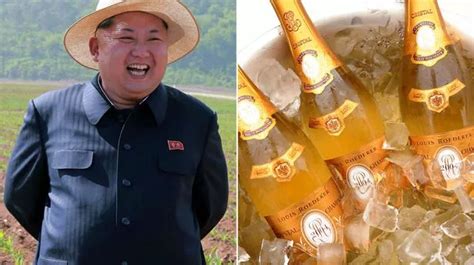
Kim Jong-Un’s penchant for luxury has once again drawn international attention, this time focused on his alleged preference for Wagyu beef, one of the world’s most expensive and highly prized types of steak. This revelation underscores the stark contrast between the lavish lifestyle enjoyed by the North Korean leader and the widespread economic struggles faced by much of the country’s population.
North Korean leader Kim Jong-Un is reportedly a fan of Wagyu beef, a luxury food item that highlights the disparity between his opulent lifestyle and the economic hardships endured by many North Koreans. Wagyu beef, renowned for its intense marbling, tenderness, and rich flavor, comes from specific breeds of Japanese cattle meticulously raised to produce meat that commands premium prices globally. The alleged consumption of such a delicacy by Kim Jong-Un raises questions about resource allocation and priorities within the isolated nation.
Wagyu beef’s exceptional quality stems from both genetic factors and intensive farming practices. The cattle are often raised in stress-free environments, fed specialized diets, and closely monitored to ensure optimal fat distribution within the muscle tissue. This marbling, technically known as intramuscular fat, is what gives Wagyu its distinctive taste and texture, making it a sought-after delicacy in high-end restaurants and gourmet markets worldwide. Specific breeds like Japanese Black (Kuroge Washu), Japanese Brown (Akage Washu), Japanese Polled (Mukaku Washu), and Japanese Shorthorn (Nihon Tankaku Washu) are the only four breeds that can be labelled Wagyu.
The consumption of Wagyu beef by Kim Jong-Un is not merely a matter of personal preference; it carries significant political and ethical implications. North Korea has faced chronic food shortages and economic instability for decades, relying heavily on international aid to feed its population. The United Nations and various humanitarian organizations have repeatedly warned about widespread malnutrition and food insecurity, particularly among vulnerable groups such as children and the elderly.
According to the World Food Programme (WFP), a significant portion of the North Korean population remains undernourished, lacking access to sufficient and nutritious food. Reports of families struggling to meet their basic needs are common, highlighting the dire economic conditions prevailing in many parts of the country. In this context, the extravagance of indulging in Wagyu beef, which can cost hundreds of dollars per pound, appears particularly jarring.
This contrast fuels criticism of the North Korean regime’s priorities and its allocation of resources. Critics argue that instead of prioritizing luxury goods for the ruling elite, the government should focus on addressing the pressing needs of its people, ensuring food security, and investing in sustainable economic development. The opulence displayed by Kim Jong-Un is often seen as a symbol of the regime’s disregard for the welfare of ordinary citizens.
The international community has long imposed sanctions on North Korea in response to its nuclear weapons program and human rights abuses. These sanctions aim to curtail the regime’s access to resources that could be used to fund its military ambitions. However, critics argue that the sanctions also have unintended consequences, exacerbating the economic hardships faced by the North Korean population.
The situation is further complicated by the North Korean government’s opaque financial practices and its ability to circumvent sanctions through illicit activities such as smuggling and cybercrime. These activities enable the regime to maintain its grip on power and continue indulging in luxury consumption, despite the economic constraints imposed by international sanctions.
The revelation about Kim Jong-Un’s alleged Wagyu beef preference underscores the challenges of addressing the complex issues facing North Korea. While sanctions and diplomatic pressure may be necessary to deter the regime’s nuclear ambitions and human rights abuses, it is equally important to ensure that humanitarian aid reaches those in need and that the North Korean people are not further victimized by the actions of their leaders.
The issue also highlights the broader debate about the role of personal choices in political leadership. While leaders are entitled to their own preferences and lifestyles, their actions can have a significant impact on public perception and trust. In a country where many struggle to afford basic necessities, the conspicuous consumption of luxury goods by the leader can erode public confidence and fuel resentment.
The situation in North Korea serves as a reminder of the importance of ethical leadership and the need for governments to prioritize the well-being of their citizens. It also underscores the challenges of addressing complex political and economic issues in a country isolated from the international community and ruled by an authoritarian regime. The ongoing debate about sanctions, humanitarian aid, and diplomatic engagement reflects the difficulty of finding effective solutions that balance the need to deter harmful behavior with the imperative to alleviate human suffering.
Kim Jong-Un’s fondness for high-end delicacies like Wagyu beef is hardly a new revelation when it comes to authoritarian leaders. History is replete with examples of rulers living in extravagant luxury while their populations struggle with poverty and deprivation. Such displays of opulence often serve as a tool for maintaining power, projecting an image of strength and invincibility. However, they also carry the risk of alienating the populace and fueling discontent.
The information circulating about Kim Jong-Un consuming Wagyu beef emphasizes the disconnect between the leader and the people. It highlights the need for greater transparency and accountability in North Korea’s governance and resource allocation. The international community must continue to monitor the situation closely and explore ways to promote human rights and improve the living conditions of the North Korean people while also addressing the security concerns posed by the regime’s nuclear ambitions.
The controversy surrounding Kim Jong-Un’s alleged Wagyu beef consumption also touches on the broader issue of food ethics and sustainability. As the global population continues to grow, concerns about the environmental impact of food production and the ethical implications of consuming luxury items are becoming increasingly relevant. Wagyu beef production, in particular, is resource-intensive, requiring significant amounts of land, water, and feed. The environmental footprint of such consumption raises questions about sustainability and the need for more responsible food choices.
The situation in North Korea underscores the interconnectedness of global issues and the need for a holistic approach to addressing complex challenges. It requires a combination of political pressure, economic incentives, and humanitarian assistance, as well as a commitment to promoting human rights and sustainable development. The international community must work together to find solutions that benefit the North Korean people while also ensuring regional security and stability.
Furthermore, the incident underscores the importance of accurate and reliable information in shaping public opinion and influencing policy decisions. The media plays a crucial role in reporting on the situation in North Korea, providing insights into the country’s political dynamics, economic conditions, and humanitarian challenges. It is essential for journalists to maintain high standards of accuracy and objectivity, avoiding sensationalism and relying on credible sources of information.
The North Korean regime’s control over information makes it difficult to verify claims about Kim Jong-Un’s lifestyle and the overall situation in the country. However, reports from defectors, aid workers, and international organizations provide valuable insights into the realities of life in North Korea. These sources must be carefully evaluated and corroborated to ensure the accuracy of the information presented to the public.
In conclusion, the revelation about Kim Jong-Un’s alleged Wagyu beef consumption is a symptom of a much larger problem: the systemic inequality and human rights abuses that plague North Korea. Addressing these issues requires a comprehensive and sustained effort by the international community, involving political pressure, economic sanctions, humanitarian assistance, and a commitment to promoting human rights and sustainable development. The focus must remain on improving the lives of the North Korean people while also ensuring regional security and stability. The extravagance of the leader must be weighed against the needs of the population to bring awareness to the injustices of the regime.
The incident involving Kim Jong-Un and the Wagyu beef also highlights the ongoing debate about the effectiveness of economic sanctions as a tool for influencing the behavior of authoritarian regimes. While sanctions are intended to pressure governments to change their policies, they can also have unintended consequences, such as exacerbating economic hardship and harming vulnerable populations. It is important to carefully consider the potential impacts of sanctions and to ensure that humanitarian aid is not impeded.
Moreover, the situation underscores the importance of engaging with North Korea through diplomatic channels, even in the face of significant challenges. Dialogue and negotiation can provide opportunities to address security concerns, promote human rights, and improve the living conditions of the North Korean people. While progress may be slow and difficult, it is essential to maintain communication channels and to explore all possible avenues for peaceful resolution.
The controversy surrounding Kim Jong-Un’s alleged Wagyu beef consumption also raises questions about the role of individual responsibility in addressing global challenges. While governments and international organizations have a crucial role to play, individuals can also make a difference through their choices and actions. Consumers can support sustainable and ethical food production practices, advocate for human rights, and promote greater awareness of global issues.
Ultimately, addressing the complex challenges facing North Korea requires a collective effort by governments, international organizations, civil society groups, and individuals. It requires a commitment to promoting human rights, sustainable development, and peaceful resolution of conflicts. The extravagance of the North Korean leader should not distract from the urgent need to alleviate the suffering of the North Korean people and to create a more just and equitable world.
The incident also underscores the power of symbolism in politics. The consumption of Wagyu beef by Kim Jong-Un is not just a matter of personal taste; it is a symbolic act that conveys a message about power, privilege, and status. Such symbols can be both unifying and divisive, depending on how they are perceived by different groups. In a country where many struggle to afford basic necessities, the conspicuous consumption of luxury goods by the leader can be deeply alienating and can fuel resentment.
The international community must be mindful of the symbolic impact of its actions and policies. Sanctions, aid programs, and diplomatic initiatives can all carry symbolic weight, and it is important to ensure that these symbols align with the values of human rights, justice, and equality. The goal should be to send a clear message to the North Korean regime that its actions are unacceptable and that it must respect the rights and dignity of its people.
In addition, the incident highlights the importance of promoting cultural exchange and understanding. By fostering greater interaction between people from different countries, it is possible to break down stereotypes, build trust, and promote empathy. Cultural exchange programs can provide opportunities for North Koreans to learn about the outside world and for foreigners to learn about North Korean culture and society.
Finally, the controversy surrounding Kim Jong-Un’s alleged Wagyu beef consumption serves as a reminder of the enduring power of hope. Despite the challenges and obstacles, it is essential to maintain hope for a better future for the North Korean people. By working together, the international community can help to create the conditions for positive change, promoting human rights, sustainable development, and peaceful resolution of conflicts.
The situation also emphasizes the need for greater transparency and accountability in the global food system. The production and distribution of food have significant environmental, social, and economic impacts, and it is important to ensure that these impacts are properly accounted for. Consumers have a right to know where their food comes from and how it is produced, and governments have a responsibility to regulate the food industry to protect public health and the environment.
The incident involving Kim Jong-Un and the Wagyu beef underscores the interconnectedness of global challenges and the need for a comprehensive and integrated approach to addressing them. Issues such as poverty, inequality, human rights abuses, and environmental degradation are all interconnected, and they cannot be addressed in isolation. A holistic approach that takes into account the complex interactions between these issues is essential for achieving sustainable and equitable development.
The international community must also recognize the importance of empowering local communities in North Korea. Local communities are often best positioned to understand the challenges they face and to develop solutions that are tailored to their specific needs. By supporting local initiatives and promoting community-based development, it is possible to build resilience and create opportunities for positive change.
In conclusion, the controversy surrounding Kim Jong-Un’s alleged Wagyu beef consumption is a complex and multifaceted issue that highlights the challenges facing North Korea and the international community. Addressing these challenges requires a comprehensive and sustained effort by governments, international organizations, civil society groups, and individuals. It requires a commitment to promoting human rights, sustainable development, and peaceful resolution of conflicts. The extravagance of the North Korean leader should not distract from the urgent need to alleviate the suffering of the North Korean people and to create a more just and equitable world. The focus should always remain on uplifting the lives of the North Korean people and advocating for a more humane and just world.
Frequently Asked Questions (FAQ):
-
What is Wagyu beef and why is it so expensive?
- Wagyu beef is a premium type of beef from specific breeds of Japanese cattle, known for their intense marbling (intramuscular fat). This marbling gives the beef its distinctive tenderness, rich flavor, and high fat content. The cattle are raised under strict conditions with specialized diets, contributing to the high cost. “Wagyu beef, renowned for its intense marbling, tenderness, and rich flavor, comes from specific breeds of Japanese cattle meticulously raised to produce meat that commands premium prices globally.”
-
What are the main criticisms surrounding Kim Jong-Un’s alleged consumption of Wagyu beef?
- The primary criticism stems from the stark contrast between Kim Jong-Un’s luxurious lifestyle and the widespread poverty and food shortages experienced by many North Koreans. Critics argue that resources should be allocated to address the needs of the population rather than indulging in expensive delicacies. “This revelation underscores the stark contrast between the lavish lifestyle enjoyed by the North Korean leader and the widespread economic struggles faced by much of the country’s population.”
-
How does North Korea’s economic situation impact its ability to provide food for its citizens?
- North Korea has faced chronic food shortages and economic instability for decades, relying on international aid. International sanctions, while aimed at curbing the regime’s nuclear program, also exacerbate economic hardships for the population. “North Korea has faced chronic food shortages and economic instability for decades, relying heavily on international aid to feed its population.”
-
What role do international sanctions play in North Korea’s economy and the availability of resources?
- International sanctions are intended to curtail North Korea’s access to resources that could be used for its military ambitions. However, critics argue that these sanctions also negatively impact the North Korean population by worsening economic conditions and limiting access to essential goods. “The international community has long imposed sanctions on North Korea in response to its nuclear weapons program and human rights abuses. These sanctions aim to curtail the regime’s access to resources that could be used to fund its military ambitions.”
-
What can the international community do to address the humanitarian situation in North Korea while also addressing concerns about the regime’s actions?
- The international community faces a complex challenge. It needs to balance the need to deter North Korea’s nuclear ambitions and human rights abuses with the imperative to alleviate human suffering. This involves diplomatic pressure, economic incentives, and humanitarian assistance, as well as a commitment to promoting human rights and sustainable development. “The situation in North Korea serves as a reminder of the importance of ethical leadership and the need for governments to prioritize the well-being of their citizens.”









